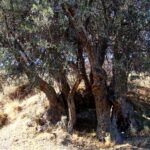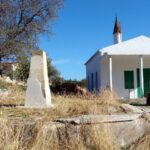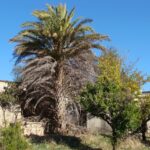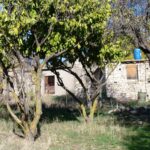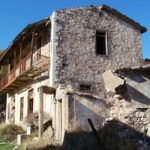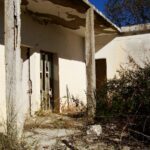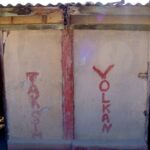What does Vretsia mean?
It is extremely challenging to define the meaning behind the name "Vretsia". We have three speculations for this name:
- According to Nearchos Klerides1Νέαρχος Κληρίδης - Χωριά και Πολιτείες της Κύπρου, Λευκωσία 1961., the initial name of the village was "Kritsia" but it was corrupted during the Frankish Rule. Still, if the name was Kritsia, it is unknown what that word means.
- According to Prio Cyprus Centrehttp://www.prio-cyprus-displacement.net/default_print.asp?id=530, "Vretsia" is a word in the Greek Cypriot dialect that actually means "getting wet". This is impossible to confirm as people of our days are no longer aware of such a peculiar word.
- I conducted a research in 20162Petrou Christos - Ταξίδια εντός Κύπρου σε 45 χωριά, μεταξύ 2008-2010, 2016 to find out the answer. In an interview of Mustafa Cemal to the Turkish Cypriot newspaper «Havadis» in 20143«Vretça, Vretça dedikleri…», https://haberkibris.com/vretca-vretca-dedikleri-2014-09-07.html, Mustafa who comes from Vretça (as it written in Turkish) claimed that in his village existed ruins of a Catholic church, implying that the besides Christians Orthodox and Muslims, the village had formerly been inhabited by Christian Catholics. He said that the name of the village comes from the Venetians, as "Vretça does not make any sense in Turkish". Mustafa added that it was told to him that there was a similar place in Italy related to the "fountain / gushing water". With the assistance of a linguist expert, Andreas Andreou, we came up to the conclusion that Vretsia could initially be named "Frekkia", meaning "Wells" in the Greek Cypriot dialect. Frekkia could be corrupted into Vretsia as it happened in other occasions "f" to be pronounced as "v" and "k" or "kk" into "ts" or "ch". This is of course speculation partly related to Mustafa Cemal's claim that the meaning of Vretsia relates to a source of water.
Vretsia was initially a Christian village
This may come as a shock to some Turkish Cypriots grown in Vretsia but research reveals that Vretsia was initially a Christian village. In 20084Petrou Christos - Ταξίδια εντός Κύπρου σε 45 χωριά, μεταξύ 2008-2010, 2016 I interviewed the elderly Kostas Andreou from the neighbouring village of Kilinia. According to Kostas Andreou, in Vretsia existed the Church of Agia Paraskevi, the Church of Agios Mamas, the Church of Agios Georgios, the Church of Agios Varnavas and the Monastery of Ekso Kyra. He added that some ruins of those ancient monuments he had the chance to witness himself. Surprisingly, "there were more small churches of whose memory did not survive".
Mister Andreou's claims have stabile foundations as we check the "Complete Gazeteer of Cyprus", which saves the toponyms and ancient monuments of Vretsia. According to these governmental records, Agia Paraskevi existed as a church5https://www.geonoma.gov.cy/myfiles/ekdoseis/cygazetteer/26/#zoom=z, Agios Georgios church also existed6https://www.geonoma.gov.cy/myfiles/ekdoseis/cygazetteer/42/#zoom=z. Agios Varnavas survives as a toponym7https://www.geonoma.gov.cy/myfiles/ekdoseis/cygazetteer/36/#zoom=z, Ekso Kyra also survives as a toponym8https://www.geonoma.gov.cy/myfiles/ekdoseis/cygazetteer/369/#zoom=z. Additionally, there is a stream called "Argaki tis Agias Koronas", which means "Stream of Saint Korona" (Stream, possibly of the Roman Catholic Saint Corinne - this agrees with the claim of Mustafa Cemal that there was a Catholic church in Vretsia).
In addition to the above, in a 2016 research9Petrou Christos - Ταξίδια εντός Κύπρου σε 45 χωριά, μεταξύ 2008-2010, 2016, I also found the toponym of Άγιος Κουρνουτής (Saint Kournoutis, a saint who arrived from the lands of Palestine in Cyprus and lived between the 11th and 12th century), and Άγιος Κόνωνας (Agios Kononas, there are two very ancient saints, one Cypriot and one from Minor Asia), agreeing with the claim of Kostas Andreou that there were more churches in the past of which their existence faded in the memory of the following generations.
Vretsia appears as a "mixed" village
According to Mustafa Cemal10«Vretça, Vretça dedikleri…», https://haberkibris.com/vretca-vretca-dedikleri-2014-09-07.html the first Muslims arrived in Vretsia from the village of Akourdaleia. We can't speculate when this happened, and we don't know if they were the only inhabitants of the village, and if not, we can't know how many Christians existed. The first census recorded in Vretsia happened after the Ottoman Rule, when Cyprus was a colony to the English, in 1891 when the village was mostly inhabited by Muslims, 291 versus only 14 Christians. The drop in the Christian population should have been dramatic as a place with so many Christian religious buildings should not support only 14 individuals. Hence there are three possibilities, either the Christians abandoned the village through the centuries, or they converted to Islam or both. We can't know the answer but it's surprising that within ten years the 14 individuals decreased to 5.
The last Christians abandon Vretsia
A family of 4 were the last Christians who lived in the village and abandoned it one night11Petrou Christos - Ταξίδια εντός Κύπρου σε 45 χωριά, μεταξύ 2008-2010, 2016 between the years 1946-1960. I was told by Kostas Andreou that a priest had two daughters, and one day a Muslim expressed to him his desire to marry his daughter. It was unacceptable for a Christian woman to marry a Muslim man, and the priest petrified fled the village the same night and found refuge in neighbouring Kilinia, but since "he didn't like the place", he once again left another community and settled down in nearby Statos. Thus, in the census of 196012http://www.prio-cyprus-displacement.net/default_print.asp?id=530, when Cyprus had become an independent country, Vretsia village appears to have 386 Muslims/Turkish Cypriots and no-one else. The Turkish community of Vretsia had already renamed the village in 1958 to Dağaşan, meaning "persons who overcome the mountain".

